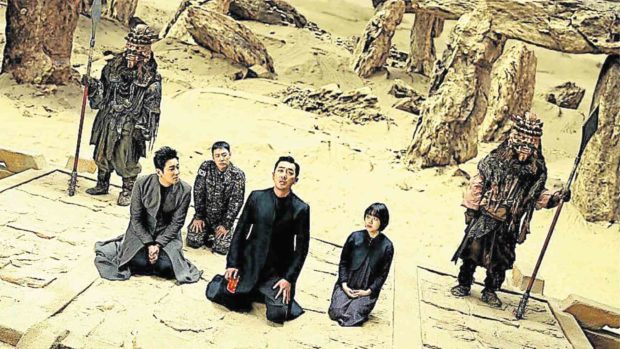(First of two parts)
TAIPEI—For the past two months, we spent most of our weekends directing the touring production of the pop musical “Nasaan si Hesus?,” starring Dulce and Bimbo Cerrudo.
So, we found it appropriately ironic to skip one Sunday rehearsal of our play about people searching for the presence of Christ in their lives, to meet the “Gods”—in this case, the screen deities who rule the roost in “Along with the Gods: The Last 49 Days.”
The blockbuster South Korean film franchise has eclipsed “Train to Busan’s” record at the tills—which is no easy feat.
The series’ first installment “The Two Worlds,” shown in Manila in February, may have been lengthy but compelling, so the quick trip to meet its stars allowed us to revisit the franchise’s ample cinematic treats. Moreover, we also saw the trip as a rare opportunity to catch up with our friend, seasoned journalist Ricky Lo.
But, the eagerly anticipated release of “The Last 49 Days,” which seamlessly juggles provocative drama, edge-of-your-seat action and “Jurassic Park”-channeling adventure, hasn’t come without any controversy.
In fact, some scenes featuring veteran actors Oh Dal-su and Choi Il-hwa were either reshot or left on the cutting-room floor following sexual assault allegations involving them, as the #MeToo movement slowly gained traction in South Korea early this year.
Interestingly, film master Kim Ki-duk and actor Cho Jae-hyeon were also dragged into multiple allegations of sexual abuse. And, actor Jo Min-ki committed suicide in March after he was accused of sexually assaulting at least eight people. But, that’s another story.
Be that as it may, it has been proven time and again that, while the mills of the gods grind slowly, they nevertheless grind exceedingly fine.
“The Two Worlds” is about fireman Kim Ja-hong (Cha Tae-hyun) and the three Grim Reapers, Gang-rim (Ha Jung-woo), Haewonmak (Ju Ji-hoon) and Lee Deok-choon (Kim Hyang-gi), who keep him company in the afterlife, as he goes through seven consecutive trials in 49 days to determine whether he deserves to be reincarnated or not.
In this parallel reality, every person who dies must hurdle make-or-break challenges in seven Hells, namely the Hells of Murder, Indolence, Deceit, Injustice, Betrayal, Violence and Filial Impiety.
“Along with the Gods: The Last 49 Days,” the sequel that begins its theatrical run on Sept. 5, unleashes a plethora of challenges for the three Guardians. It’s distributed by Viva Films in the Philippines.
This time around, Gang-rim chooses to bring Ja-hong’s brother, aspiring lawyer Soo-hong (Kim Dong-wook), to court
—but, only if Haewonmak and Lee Deok-choon succeed in fetching an old man who is being closely guarded by the Seongju God (Don Lee aka Ma Dong-seok of “Train to Busan” fame).
When we asked director Kim Yong-hwa what sets “The Last 49 Days” apart from “The Two Worlds,” he enthused, “‘The Last 49 Days’ features the same characters. But there are shocking revelations in it that take its tale to the opposite direction, as well as a secret character that is crucial to the story. The second installment might be better because of those elements.”
Here’s our Q&A with director Kim Yong-hwa, and his gorgeous stars, Ju Ji-hoon, Kim Hyang-gi, Don Lee and Kim Dong-wook. (Thanks to Tcel Maramag, who took a break from her bar exam review to translate their answers.)
Why has “Along with the Gods” struck a chord with different moviegoers from all over Asia?
Ji-hoon: In my opinion, our world has a lot of similarities with the afterlife, so stories about it pique viewers’ curiosity.
Hyang-gi: The audience can relate to the genuine emotions they sense from the actors.
Don: People sympathize with our film because it deals with complicated relationships and forgiveness.
Dong-wook: We’ve neither been to heaven nor hell, but the movie centers around filial harmony, like the love between parents and children. The fact that it’s also about forgiveness makes it relatable to viewers everywhere.
If you have to go through the Seven Hells, which would you find most challenging?
Yong-hwa: Fool’s Hell (Deceit) would be the most difficult, because I’ve told a lot of white lies, not for myself, but for others.
Ji-hoon: Fool’s Hell (Deceit), because it’s hard not to tell a lie, even if it’s just a tall tale.
Hyang-gi: At first, I thought it would be the trials that concern our relationships of others (Filial Impiety).
But now, I think it’s Laziness (Indolence), because there was a time that I kept postponing what I was supposed to do, because of the hot weather in Korea.
Don: I’m afraid of all the stages of Hell.
Dong-wook: For me, it would be Violence. There’s physical violence, but I also could have hurt some people because of my thoughts and actions.
What is the franchise’s most important message?
Hyang-gi: More than anything, the film teaches the importance of sincerity and forgiveness.
Yong-hwa: Yes, we need sincerity in the way we live our lives.
Dong-wook: The film’s most important theme is the one about human relationships—how we treat other people and the way we interact with them.
Next: Ha Jung-woo.
